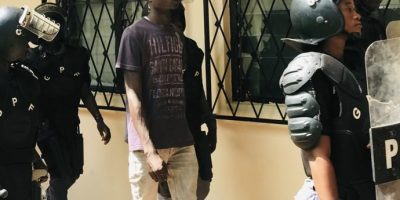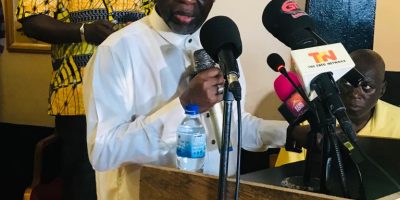 Hon. Ministers;
Hon. Ministers;
Government Spokesperson;
Members of the Media;
Ladies and Gentlemen;
Welcome to the maiden edition of the Inter-Ministerial Press Conference coordinated by Ministry of Information & Communication Infrastructure (MOICI) through the office of the Government Spokesperson. This event is part of broader activities to articulate the programs and activities of the Government of The Gambia for Citizens to make informed choices. The government of The Gambia has committed itself to ensuring that this weekly interface becomes a routine process of working with the media to transmit public information to the entire population. The methodology of this engagement is that every Friday, government will be releasing a weekly roundup of important programs and activities that have been implemented or are being implemented across the broad spectrum of Government Ministries, Departments and Agencies (MDAs.)
I would now like to read our weekly round up from the various Ministries.
Ministry of Women Children and Social Welfare:
As part of efforts to support vegetable growers across the country, the Ministry of Women Children and Social Welfare, has recently engaged women onion growers to buy all their produce at farm gate price. A total of 750 bags of 18kilos of onion was bought from women producers. The Ministry of Women Children and Social Welfare having seen the attendant benefits associated with this arrangement, has now decided to work with the private sector in collaboration with the Ministry of Trade to facilitate the purchase of locally produced onions across The Gambia. Efforts have now begun to form the women producers into co-operatives to ensure that there are enough locally produced onions in the country that will be bought directly by the private sector. In order to ensure sustainability of this initiative, government will from now on place a moratorium on the importation of onions into the country when the locally produced ones are being harvested.
Ministry of Health and Social Welfare:
As part of efforts to effectively combat the COVID 19 pandemic, the government of The Gambia has commenced paying honorarium to Covi-19 frontline workers. An amount of 100 million Dalasi has been put aside for this activity. The frontline health workers have been categorized into 4 groups as follows:
• Low risk
• Moderate risk
• High risk and
• High Risk Plus
The payment of the COVID 19 honorarium to frontline health workers is part of government’s decision to supplement the good efforts that healthcare personnel are doing in this critical period. Government continues to be fully engaged in the fight against COVID 19. The Ministry of Health together with its partners is accelerating the public information Campaign for the general public to be fully sensitized and compliant with the preventative rules set out by the WHO to protect themselves against the virus.
Ministry of Higher Education Research Science and Technology:
The Ministry of Higher Education, Research Science and Technology (MoHERST) has recently paid over Twelve Million, Nine Hundred Thousand Dalasi (D12, 900,000.00) to non-government funded Gambian students studying abroad. A total of 836 Gambian students in different parts of the world benefited from this package with a $300 one-off payment. This was part of Government’s initial response to support non-government funded students abroad. Currently the Ministry of Higher Education is pursuing additional funds to support the remaining set of students who are yet to receive help in the first phase. Similarly, the Higher Education Ministry was able to fast track the annual top-up stipend for the academic year 2019-2020 amounting to over D16 million for 321 students equivalent to 317, 680.00 USD. These said students are the ones who have gone through the Ministry of Higher Education through bilateral corporation and are not supposed to benefit from the COVID 19 support. These are students in Sudan, India, Tunisia, Morocco and Indonesia.
Ministry of Youth and Sports:
The Ministry of Youth and Sports (MOYS) recently commenced a multimillion-dalasi project for the construction of mini stadia in all regions of The Gambia, including Kiang Julafarr Manduar in the Lower River Region, Kafuta, in Kombo East in the West Coast Region and Fula Bantang in the Central River Region. Similar projects are expected to be inaugurated soon, in Brikama, Kassa Kunda and Bwiam in the West Coast Region, Barra in the North Bank Region, Pakali Ba in Lower River Region, Kaur and Janjanbureh in Central River Region and Diabougu in the Upper River Region. The Basse Koba Kunda mini stadium, the Soma mini Stadium and the Farafenni mini stadium are to be elevated to standard mini stadia with over 20,000 capacity each. The Gambia’s youth constitute about 70% of the population which necessitates the need for their effective mainstreaming in government’s development agenda to drive the country’s socioeconomic change. Currently, a total of 154 youths are on training in different skill areas such as plumbing, construction, welding, fabrication and carpentry under the supervision of National Youth Service Scheme (NYSS). There are also plans to set up a pilot scheme for the implementation of training, production, processing and marketing of locally grown rice to support national food security drive initially with 50 young people at Sapu Field Station in Central River Region for this initiative. This activity is costed at about eight million Dalasis and will last for 12 months. There are also plans to upgrade the Nyaniberri Farm to provide integrated sustainable Agricultural production in The Gambia.
Ministry of Defence:
With the support and collaboration of Development Partners and relevant Stakeholders, the Ministry of Defence is in the process of drafting a Defence Policy, which is the first of its kind in the history of the Gambia. When completed, the Defence Policy will guide the operations and activities of the Ministry and the Gambia Armed Forces in line with international best practices. As part of the efforts to address growing concerns over the location of the Gambia Armed Forces firing range at the Brikama Jamisa, the services of experts from the British Army were engaged and they have done some feasibility studies in some areas within the country side for possible relocation of the range. This process is ongoing and it is expected to be completed in due course.
Also the Ministry of Defence had series of consultative engagements with development Partners gear towards strengthening the Ministry’s Civil-Military cooperation and foster collaboration on the ongoing Security Sector Reform in the area of Defence. In June 2020, the National Assembly ratified two agreements between the Government of Turkey and the Government of The Gambia on Military Cooperation signed in 2019 as follows: –
1. The Implementation of Protocol regarding the financial assistance agreement between the Government of Turkey and the Government The Gambia on cooperation in Military Field of Training, Technique and Science, signed on the 22nd May 2019 and;
2. The Military Financial Cooperation Agreement between the Government of Turkey and the Government of The Gambia, signed on the 22nd May 2019.
These two ratified agreements will significantly benefit the Gambia Armed Forces in the areas of capacity building and peace keeping operations.
Ministry of Finance and Economic Affairs:
The Gambia recently reached a staff level agreement with the International Monetary Fund paving a way for a three-year program that could be supported by an Extended Credit Facility (ECF) arrangement in the amount of SDR 35 million (or around $US 48 million).
The IMF was impressed with The Gambia’s strong performance with the country gaining competitiveness as a tourist destination, strong private sector consumption and investment supported by foreign exchange inflows and greater availability of credit. Over the medium term, sound macroeconomic policies will underpin the prospects for sustained growth, the strengthening of foreign exchange buffers, and inflation moderating from an average of 7.1 percent in 2019 to the Central Bank of The Gambia’s target of 5 percent in 2019.
Gambia’s bilateral partners have also recognized significantly improved fiscal efforts in 2018 and 2019 which helped to reduce the deficit, in major part, thanks to strong domestic revenue mobilization. Efforts by the Ministry of Finance to maintain fiscal transparency and sound procurement governance procedures have been roundly praised by our development partners with the United States Government releasing a report this week that The Gambia has met the minimum requirement for fiscal transparency. The US Fiscal Transparency Report says key documents of The Gambia’s budget documents are publicly available which are substantially complete and are generally reliable.
The Gambia has made much needed progress on the restructuring of its external debt. Debt service deferrals, agreed with most of participating creditors, have markedly improved The Gambia’s debt outlook and enabled it to exit from debt distress.
The Ministry of Finance is also working with partners to strengthen revenue mobilization, public financial management and the governance of state-owned enterprises, while improving public investment and procurement processes. As institutional capacity develops, the Ministry of Finance is also focusing on reforms to cater for novel components, including gender budgeting and addressing climate change-induced economic challenges, which are of primary importance for The Gambia given its unique ecosystem.
Ministry of Trade Industry Regional Integration and Employment
As part of the efforts to ease the impact of the COVID 19 on the economy and the population in General, the Ministry of Trade Regional Integration and Employment spearheaded the implementation of the essential commodities emergency power regulation 2020 to regulate the supply and prices of essential commodities in the market. This regulation and other government intervention ensure Gambian do not suffer from any shortage in food items or unnecessary price hiking.
• The moratorium on the importation of onions and potatoes was lifted with a view to stabilize supplies.
• The task force to facilitate the availability of rams for Tobaski has been launched and is working with all stakeholders to ease movement and sale of rams in the era of COVID-19. The objective is to discuss and agree on modalities for accessibility and affordability of the livestock to the general public during this important feast.
• There has been a Cabinet Subcommittee setup consisting MOTIE, Ministry of Justice, Ministry of Lands and Regional Government and Ministry of Finance and Economic Affairs who were task by cabinet to sort out the Banjul Breweries Saga on the outcome of this meeting a taskforce comprising of technicians from this respective ministries are to meet and assigned task to the taskforce to come with a position on Banjul Breweries on the way forward for the company with Government’s wishing to maintain production.
Ministry of Fisheries and Water Resources
The Ministry of Fisheries and water resources since 2017 has been spearheading efforts to enhance a sustainable and vibrant fisheries and aquaculture industries in the Gambia. From September 2019 to June 2020 alone, more than 1030 Gambians have been directly employed by the sector as either observers, onboard fishing toilers or deck-hands. During the corresponding period, a total of GMD 178 Million has been generated from license fees, 10% fish landings and fines from infringements.
The Ministry of fisheries and water resources has also been spearheading the supply of clean portable drinking water to vulnerable communities across the Gambia. Just recently, the Minister for Fisheries and Water resources through support from the Saudi Sahelian Project, provided 27 solar powered water supply systems to 47 47rural communities in all the five administrative regions of the Gambia. over 50,000 people in target benefitted directly from this project.
Ministry of Tourism and Culture
The MOTC has embarked on putting in place robust policies and strategies as part of efforts to prepare for post COVID 19 effects on the hospitality industry. Currently the Gambia Tourism Board in collaboration with The Gambia Bureau of Statistics (GBoS) supported by the UNDP is conducting a Rapid Response Survey to ascertain the impact of the Covid-19 on tourism in The Gambia. The important exercise will among others help Government and other partners to undertake measures to mitigate the negative impacts, and most importantly formulate informed policy-decisions in the recovery of tourism in The Gambia. The Gambia just like other countries around the world is seriously affected as a result of travel restrictions associated with the COVID 19 pandemic. As part of the strategies the ministry of tourism is promoting, Local tourism by upgrading bedding and other infrastructures across the country. Just recently, the Minister of Tourism laid the foundation stone of several rural hotels between 3&4-star standards. The ultimate objective of this initiative is to create employment but also improve rural tourism infrastructure to reduce poverty and create employment opportunities for Gambia’s rural dwellers.
Ministry of Petroleum and Energy:
Petroleum
The events of the COVID 19 pandemic has led to the suspension of the planned drilling by FAR-PETRONAS FOR 3-6 MONTHS.
As a result, the drilling of a well that was scheduled for the end of 2020 have now been rescheduled to 2021. Similarly, British Petroleum’s work program will experience a delay of around 3 months, meaning BP’s drilling activities will take place in 2021.
Furthermore, on the Petroleum Products supply, due to low demand, prices have fallen. However, the Ministry of Petroleum and Energy convened an emergency meeting at the wake of the Pandemic to ensure that both heavy and light fuel were imported in bulk by oil Marketing Companies to avoid shortage during these trying times.
Through its ongoing structural and Legislative reforms, The Ministry of Petroleum and Energy has recently tabled a Bill to create an autonomous Petroleum Commission to further strengthen the regulatory landscape and ensure regulatory independence for the upstream activities of the sector. The Bill is at the National Assembly for enactment.
Energy
The Ministry via sustainable Energy fund for Africa (SEFA) under the African Development Bank (AfDB), is implementing a Green Mini-Grids (GMG) Country Support Programme. The Green Mini-grid Country Support Programme is the flagship project of SEFA to support eligible countries to develop the enabling framework and investment program for the Green Mini-grids to increase energy access and stimulate socio-economic development. Overall, the project is expected to contribute to the implementation and roll-out of green mini-grids to supply electricity to off-grid rural communities in The Gambia, thereby improving their standard of living and stimulating socio-economic development.
Geology and Mineral Resources
The Mining Sector continues to be a driving force in term of employment and availability of raw materials (sand, gravel, clay etc.) for the construction industry. As the sector in charge of mineral resources, Ministry of Petroleum and Energy has now developed regulations that will not only ensure regulatory certainty but a transparent and predictable business environment that supports government’s efforts to combat money laundering and illicit trading of precious minerals.




Ma sha Allah great and thanks for sharing